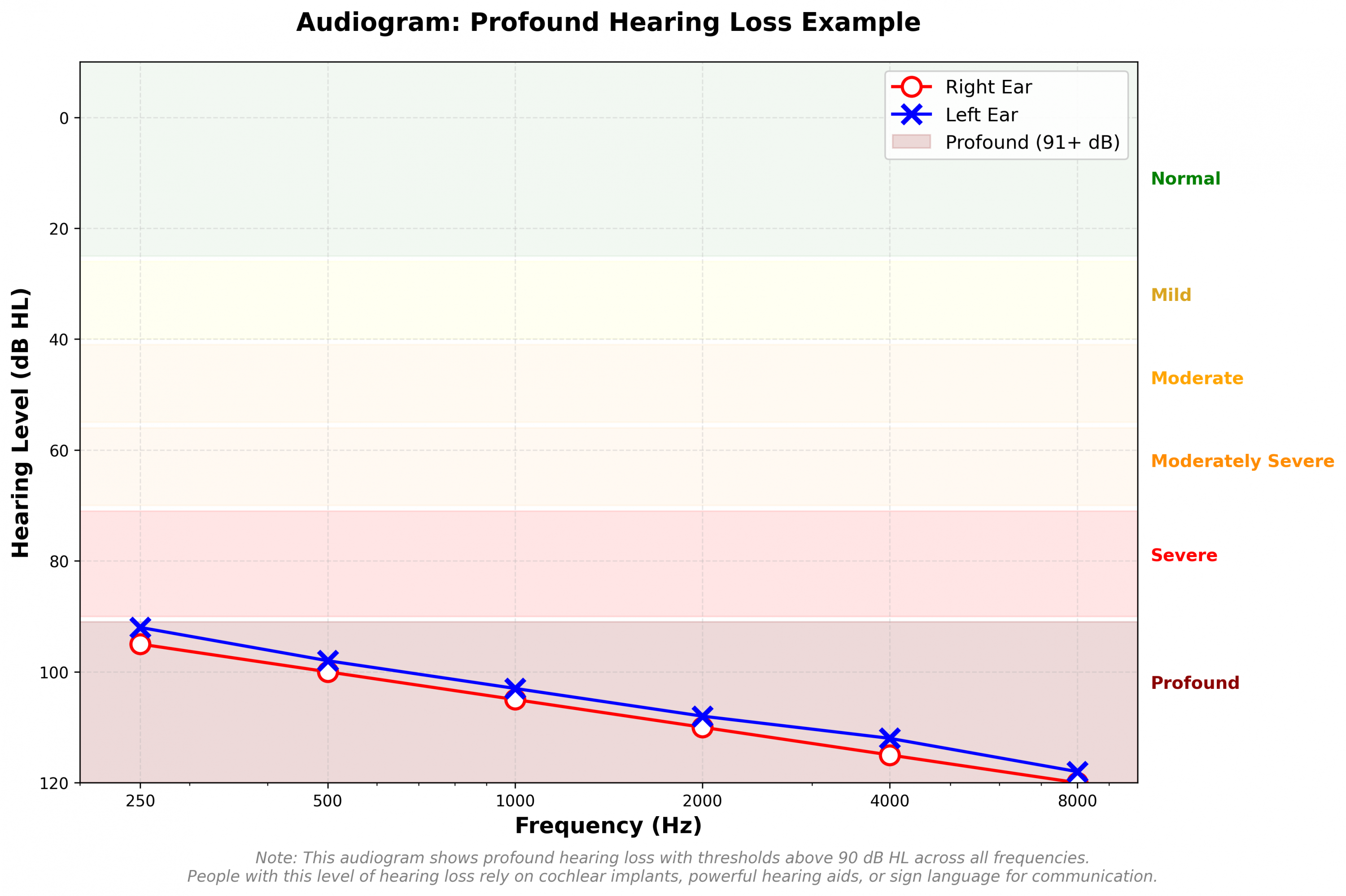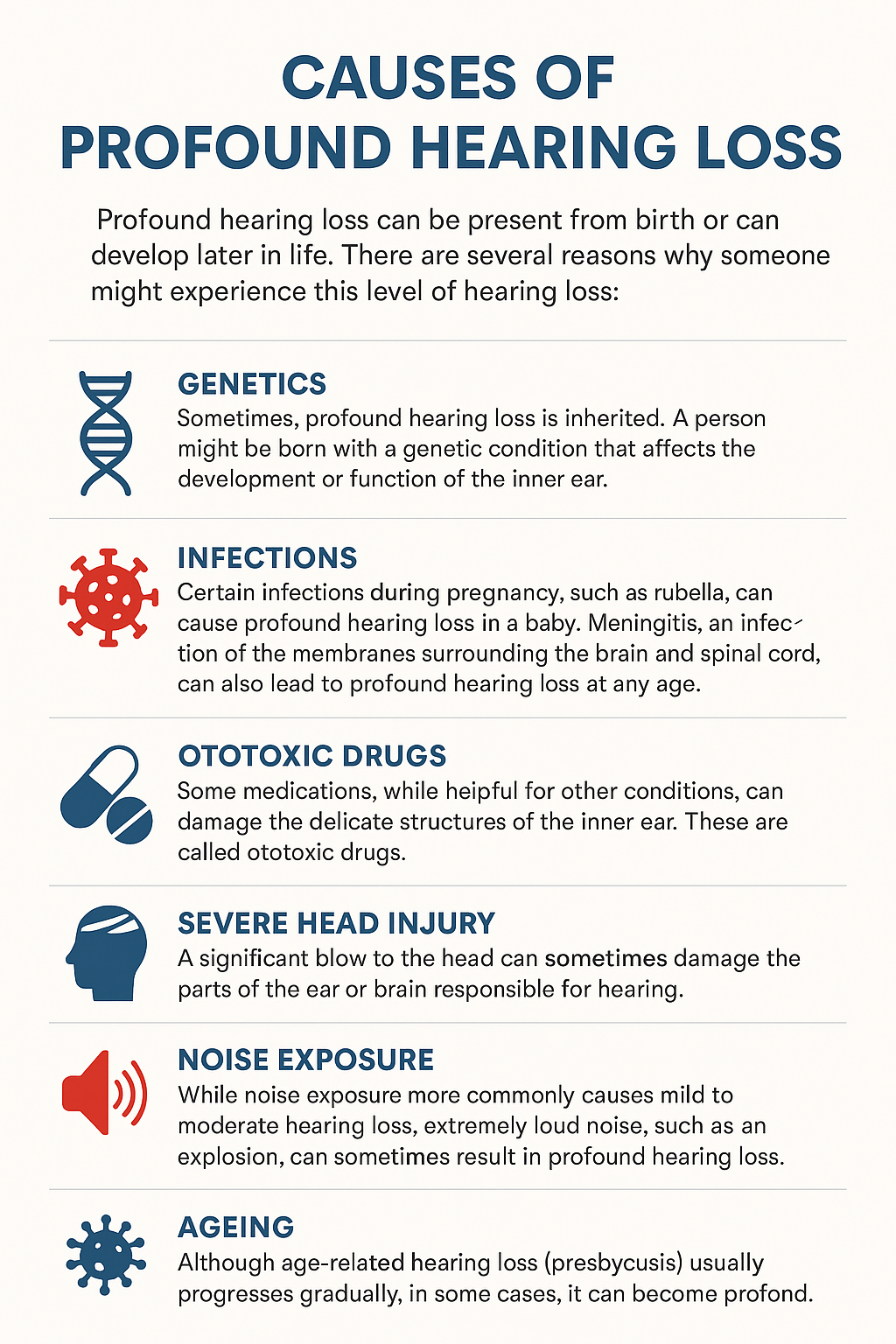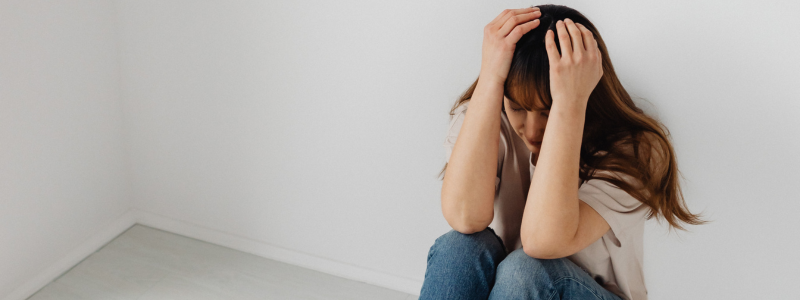
Head of Online Medical Content

Audiology Expert

What is Profound Hearing Loss?
Understanding this hearing loss, its symptoms, causes, and treatments
Overview | The hearing range | What is profound hearing loss? | The causes | Getting diagnosed | Living with profound hearing loss | Conclusion
Hearing Aid UK 21/01/2026 Update
Overview
Profound hearing loss means you have very little or no hearing, which makes everyday sounds nearly impossible to detect. It can be caused by genetics, illness, injury, or simply ageing.
Living with profound hearing loss is made easier with sign language, cochlear implants, and hearing aids. Early diagnosis through testing is important for quick treatment and a better outcome.
In this article, we briefly go through the signs, challenges, causes, diagnosis, and how to manage profound hearing loss on a day to day basis.
Understanding the hearing range
Audiologists measure hearing loss in decibels (dB), here is a quick guide on the common types of hearing loss and usual symptoms:
- Mild hearing loss: You might have trouble hearing soft speech or background noise.
- Moderate hearing loss: Voices need to be a bit louder for you to hear it.
- Severe hearing loss: Speech needs to be loud to hear, and even then, you might still struggle.
- Profound hearing loss: You may only hear very loud sounds, if at all.
Related reading: Types of hearing loss

What does profound hearing loss mean?
You have very little or no functional hearing, for example, everyday sounds like someone talking at a normal level or a phone ringing are either not heard or heard as faint vibrations. The reality is that this can make communication challenging for those with profound hearing loss.
Causes of profound hearing loss
Profound hearing loss can start from birth or develop later in life, here are the main reasons why someone might have this level of hearing loss:
- Genetics: You might be born with a genetic condition that affects the development or function of the inner ear.
- Infections: Certain infections during pregnancy, such as rubella, can cause profound hearing loss in a baby.
- Ototoxic drugs: Some medications can damage the delicate structures of the inner ear. These are called ototoxic drugs.
- Severe head injury: A major impact to the head can damage the parts of the ear or brain responsible for hearing.
- Noise exposure: While noise exposure more commonly causes mild to moderate hearing loss, extremely loud noise can result in profound hearing loss.
- Ageing: Although age-related hearing loss (presbycusis) usually progresses gradually, in some cases, it can become profound.
- Illness: Certain illnesses can affect the auditory nerve or the inner ear.

How is it diagnosed?
Diagnosing profound hearing loss comprises a complete assessment by an audiologist. The tympanometry test checks the function of the middle ear and eardrum and the audiometry, is the standard hearing test. This is when you wear headphones and respond to the sounds you hear at different frequencies and volumes. For profound hearing loss, the audiologist will be looking for responses to only the loudest sounds.
The Auditory Brainstem Response (ABR) test measures the electrical activity in the brainstem in response to sounds and the Otoacoustic Emissions (OAEs) test measures the tiny sounds produced by the inner ear, which are usually absent in cases of profound hearing loss.
Living with profound hearing loss
Living with profound hearing loss can be challenging, however, good communication is key, such as using methods like:
- Sign language: British Sign Language (BSL) is used in the UK and can be the main way of communication.
- Lip reading: This is when you watch mouth movements to understand what's being said.
- Hearing aids: Very powerful hearing aids might provide some support for profound hearing loss.
- Cochlear implants: These are small electronic devices that are surgically implanted and can restore some hearing. They bypass the damaged parts of the inner ear and send electrical signals directly to the auditory nerve.
- Text messaging and email: These written forms of communication are extremely helpful.
- Visual aids: Flashing lights can be used for doorbells, fire alarms, and alarm clocks.
Related reading: Communication tactics for those with hearing loss
The importance of an early diagnosis
For those with profound hearing loss, early intervention is so important. With adequate help, technology, and communication techniques, people with profound hearing loss can connect with others, learn, work, and enjoy everything life has to offer.
Summary
Profound hearing loss is the most severe level of hearing impairment, where even loud sounds may not be heard, however there are useful tools that can help. It can be caused by genetics, infections, head injuries, ageing, or certain medications. An early diagnosis is important to help support the condition as successfully as possible.
Why Choose Us?
- FREE Hearing Tests
- Best Hearing Aids and Prices
- FREE Aftercare for Life
- FREE Home Visits
- 200+ Local Audiologists
- 60 Day Money Back Guarantee
Do you think you have profound hearing loss?
Don't ignore it!
Don't let hearing loss hold you back. If you suspect you're having trouble hearing, take that important step and get your hearing checked.
It's for maintaining connections, being engaged, and enjoying all the noises of life to the fullest.
You can read the NHS online information leaflet on profound hearing loss here
Other hearing loss articles you might like...
 Hearing aid stigma
Hearing aid stigma  The impact of diet on your hearing
The impact of diet on your hearing  How to tell if hearing loss is permanent or temporary
How to tell if hearing loss is permanent or temporary Our specialist service includes:
Do not spend hundreds of pounds without getting a second opinion from us.
Please call us on 0800 567 7621
 Not only are the prices great, but the service is fantastic! Many thanks to your team.
Not only are the prices great, but the service is fantastic! Many thanks to your team.What's included in our hearing aid prices?
Watch the NHS video about profound hearing loss below
FAQs
In general, any audiologist will always recommend to you the hearing aid model that best suits your needs. Here is a useful checklist to make sure that is the case.
- Audiologist's level of knowledge: The audiologist you have seen will hopefully have a wide knowledge of all available hearing aids; however, some will only be familiar with a small number of brands and, therefore, may not really be in a position to know which model is the best for you. It is OK to challenge their recommendation and ask them to justify why this particular brand is the one for you.
- Do research: Read about the hearing aid that was recommended. Does it seem like it will suit your lifestyle? Does it have more or fewer features than you need?
- Be aware of sales targets: Many high street retailers have specific tie-ins to a particular manufacturer/brand. The hearing aid they have suggested may still be the correct one for you, but do your research so that you know why they might have recommended it.
If you have significant hearing loss in both ears, you should be wearing two hearing aids. Here are the audiological reasons why:
Localisation: The brain decodes information from both ears and compares and contrasts them. By analysing the minuscule time delays as well as the difference in the loudness of each sound reaching the ears, the person is able to accurately locate a sound source.
Simply put, if you have better hearing on one side than the other, you can't accurately tell what direction sounds are coming from.
Less amplification is required: A phenomenon known as “binaural summation” means that the hearing aids can be set at a lower and more natural volume setting than if you wore only one hearing aid.
Head shadow effect: High frequencies, the part of your hearing that gives clarity and meaning to speech sounds, cannot bend around your head. Only low frequencies can. Therefore, if someone is talking on your unaided side, you are likely to hear that they are speaking, but be unable to tell what they have said.
Noise reduction: The brain has its own built-in noise reduction, which is only really effective when it is receiving information from both ears. If only one ear is aided, even with the best hearing aid in the world, it will be difficult for you to hear in background noise as your brain is trying to retain all of the sounds (including background noise) rather than filtering them out.
Sound quality: We are designed to hear in stereo. Only hearing from one side sounds a lot less natural to us.
Fancy some further reading on this topic? You can read about why two hearing aids are better than one in our article, hearing aids for Both Ears, here
For most people, the main benefit of a rechargeable hearing aid is simple convenience. We are used to plugging in our phones and other devices overnight for them to charge up. Here are some other pros and cons:
For anybody with poor dexterity or issues with their fingers, having a rechargeable aid makes a huge difference, as normal hearing aid batteries are quite small and some people find them fiddly to change.
One downside is that if you forget to charge your hearing aid, then it is a problem that can't be instantly fixed. For most, a 30-minute charge will get you at least two or three hours of hearing, but if you are the type of person who is likely to forget to plug them in regularly, then you're probably better off with standard batteries.
Rechargeable aids are also a little bit bigger and are only available in Behind-the-Ear models.
Finally, just like with a mobile phone, the amount of charge you get on day one is not going to be the same as you get a few years down the line. Be sure to ask what the policy is with the manufacturer's warranty when it comes to replacing the battery.
For most people, the answer is yes. But it's never that simple.
The majority of hearing problems affect the high frequencies a lot more than the low ones. Therefore, open fitting hearing aids sound a lot more natural and ones that block your ears up can make your own voice sound like you are talking with your head in a bucket. Therefore, in-ear aids tend to be less natural.
However, the true answer is we can't tell until we have had a look in your ears to assess the size of your ear canal, and until we have tested your hearing to see which frequencies are being affected.
People with wider ear canals tend to have more flexibility, also there are open fitting modular CIC hearing aids now that do not block your ears.
There is also the age-old rule to consider, that a hearing aid will not help you if it's sat in the drawer gathering dust. If the only hearing aid you would be happy wearing is one that people can't see, then that's what you should get.
Most people can adapt to any type of hearing aid, as long as they know what to expect. Have an honest conversation with your audiologist as to what your needs are.
Generally speaking, six or more. Unless it's none at all. The number of channels a hearing aid has is often a simplistic way an audiologist will use to explain why one hearing aid is better than another, but channels are complex, and it is really not that straightforward. Here are some reasons why:
Hearing aids amplify sounds of different frequencies by different amounts. Most people have lost more high frequencies than low, and therefore need more amplification in the high frequencies. The range of sounds you hear is split into frequency bands or channels, and the hearing aids are set to provide the right amount of hearing at each frequency level.
Less than six channels, and this cannot be done with much accuracy, so six is the magic number. However, a six-channel aid is typically very basic with few other features and is suitable only for hearing a single speaker in a quiet room. The number of channels is not what you should be looking at; it's more the rest of the technology that comes with them.
As a final note, different manufacturers have different approaches. One method is not necessarily better than any other. For example, some manufacturers have as many as 64 channels in their top aids. Most tend to have between 17 and 20. One manufacturer has no channels at all.
Manufacturer's warranties typically last between 2-5 years, depending on the brand and model, and cover defects in materials and workmanship. This includes repairs for component failures, electronic malfunctions, and manufacturing defects, but excludes damage from misuse, accidents, or normal wear. Most manufacturers also include loss and damage insurance for the first year.
We handle all warranty claims on your behalf, liaising with manufacturers and ensuring you get replacement devices quickly when needed. This comprehensive warranty coverage, combined with our lifetime aftercare, gives you complete peace of mind.
Our hearing tests are completely free, whether at our clinics or in your home. Unlike other providers who charge £30-£100 for home visits, we believe hearing healthcare should be accessible without financial barriers. Our comprehensive assessments include examination by a registered audiologist, audiogram results, and personalised recommendations.
All testing, future adjustments, and ongoing support are included at no extra cost. While NHS tests are also free, typical 6-week waiting periods often lead people to seek immediate private testing. We provide prompt, professional assessments that fit your schedule and budget.
Yes, we offer completely free home visits throughout the UK, and this service is included in our prices with no additional charges. Home visits are particularly valuable for people with mobility issues, busy schedules, or those who simply prefer the comfort and convenience of their own environment.
Our audiologists can conduct full hearing tests, fit hearing aids, and provide ongoing support in your home. This service sets us apart from many providers who either don't offer home visits or charge extra for them.
We can offer prices up to 40% lower than high street retailers because of our business model. As a network of 200+ independent audiologists, we don't have the massive overheads of large retail chains - no expensive high street premises, no sales targets pushing audiologists to sell the most expensive options, and no costly marketing campaigns.
However, we maintain the same buying power as the big chains because we purchase on behalf of our entire nationwide network. This means you get access to the same premium hearing aids with professional service, but at genuinely competitive prices.
We offer a comprehensive 60-day money-back guarantee, which gives you twice the industry standard time to properly assess whether your hearing aids are right for you. This extended period recognises that adjusting to hearing aids takes time, and your brain needs several weeks to adapt to the amplified sounds.
Unlike many providers who offer just 30 days, we believe 60 days gives you the confidence to test your hearing aids in all the situations that matter to you - from quiet conversations at home to busy restaurants and outdoor activities.
Other pages you might find useful
Ask the Experts
6 Morton Lane
Walkwood
Redditch
Worcestershire
B97 5QA
Latest Launch
When we refer to a product as 'Latest Launch', we mean it is the latest to be released on the market.
New
When we refer to a product as 'New', we mean that the product is the newest hearing aid model on the market.
When we refer to a product as 'Superseded', we mean that there is a newer range available which replaces and improves on this product.
Older Model
When we refer to a product as an 'Older Model', we mean that it is has been superseded by at least two more recent hearing aid ranges.
